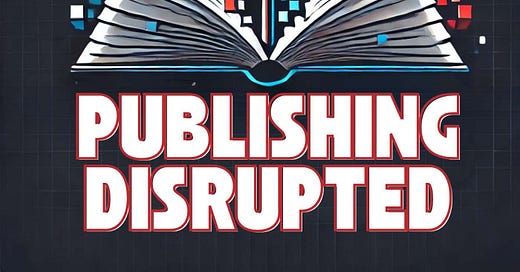Publishing Disrupted is a progressive-Christian, indie book-publishing podcast by two former Christian publishing experts,
and Mick Silva. We want to discuss the changes and questions people have about the new book publishing landscape. In this first episode, we explore our personal shift from traditional to independent nonfiction publishing and editing, and some of the challenges we face in defining our new roles.Where traditional publishing was once an “ivory tower” and only certain topics were published, the driving force of publishing is still a couple questions: What's a good conversation that needs to be had? and Where is there a hole in the market or an opportunity for a published recognizable author on a particular topic? These questions still drive audiences to read, and it’s why we believe publishing books still matters.
Independent publishing has been gaining popularity, particularly in the case of women, queer, and black publishing. However, there are challenges in defining felt needs and disrupting the familiar “lowest common denominator.” We touch on the old elitism in traditional publishing that can make books seem highbrow or exclusive in some ways. We hope to challenge this idea and provide something that inspires people to go deeper. We both hope to share more of why books still matter in today's world, and how the future of publishing lies in navigating the new landscape and embracing creative expression.
David bemoans the shift toward celebrity books, and points to the need to break free from the traditional copycat mainstream flow. There is more competition and the forces for making something more sugary and popular are stronger than ever. Mick proposes a balance between education and entertainment, aiming to educate people while entertaining them in today's new media landscape. There’s more than ever available to help authors, such as podcasts, blogs, and websites, which can offer tips and advice on how to sell their books.
David asks if we can discuss other challenges and opportunities in the publishing industry, particularly in the digital marketplace. He notes that bookstores were once exclusive to book buyers and publishers, but now they have no longer have this. As a result, publishers are turning towards authors themselves to drive awareness of their books through online platforms.
As brick-and-mortar bookstores have become less popular, with many smaller outlets closing down, there’s also been a shift towards local, boutique approaches to selling, even at the major chains like Barnes & Noble.
Overall, we’ve seen this shift leading to a greater community feeling and a higher percentage of sales happening online for entry-level authors. The digital marketplace has led to a shift towards online platforms and a more grassroots approach to publishing, and this is empowering authors and fostering a sense of community. Both of us want to share what we’re learning by being more creative rather than relying on our former traditional corporate jobs.








Share this post